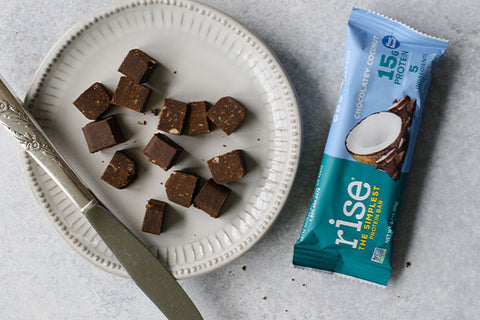
Have you ever heard of the phrase “mindful eating”?
Mindful eating is an intuitive form of eating that focuses on gaining awareness of your food and the experiences you have while eating.
And, in the last decade or so, mindful eating has really taken hold! People are practicing mindful eating because of its positive physical and psychological benefits.
Whether you’re a conscious consumption novice or an enlightened mastermind, you can always gain something from practicing mindfulness--especially when you’re eating!
Are you ready to discover the benefits of mindful eating and how you can practice it on your own?
Keep reading to get started!
What is Mindfulness?
Before we delve into the concept of mindful eating, it’s important to first understand what being mindful is really all about.
Mindfulness is a practice based on Zen Buddhism where individuals actively try to focus their conscious awareness.

People leverage this practice to live more intentionally.
By focusing on each moment with intention, people who practice mindfulness can develop the ability to hone in, without judgement, on each moment of their lives.
That sounds pretty nice, right?
Mindfulness has reportedly helped thousands of people to live more intentionally.
Because the practice helps people rid themselves of judgment and truly live in the moment, research suggests that mindfulness can actually enhance people’s ability to develop healthy skills for managing a wide range of issues, like anxiety, chronic pain, or even obesity.
Let’s turn our attention now to how practicing mindfulness can help you enhance your eating experiences.

What is Mindful Eating?
Mindful eating is the practice of paying careful attention to our food and our experience eating it, moment by moment, without any judgement.
When it comes to mindful eating, it’s not about calories, carbs, fats, or protein.
It’s all about the experience.
Specifically, this approach focuses on your sensual awareness of your food and your experience of that food.
The idea is to really hone into your senses while you’re eating. What are you smelling? How does the food feel? What are you tasting?
These questions help you direct your conscious awareness back to the present moment.
More importantly, focusing on these sensations can also encourage you to savor the moment and be fully present throughout your entire eating experience.

What are the Benefits of Mindful Eating?
Mindful eating is not designed to drive weight loss.
But, many people who adopt this style of eating actually see themselves losing weight!
Research suggests that people who adopt mindful eating actually end up eating less, by virtue of slowing down their eating habits and taking the time to savor and appreciate each bite of their meals.
When people focus on appreciating their food, they end up not being so concerned with restricting their food intake. They plug back into their bodies and listen to their body’s cues for when they should start and stop eating.
And oftentimes, this mindful approach leads people to savor more, eat less, and select foods that are consistent with their desired health benefits.
Mindful eating can also promote a great sense of contentedness. By actively practicing appreciation and attention to food, people have found they feel more satisfied and happier after each mindful eating experience.
If you’re looking to achieve certain health goals, focusing your attention on how your food makes your body feel is incredibly important. Mindful eating can help you make sure you’re consuming foods with proper nutrition and staying on track with your longer term health goals.
Tips for Practicing Mindful Eating
Are you ready to try practicing mindful eating yourself?
Follow this helpful guideline for how you can slow down, recognize cues from your body, enjoy your experience every time you eat.
- Set a timer for 20 minutes and use the entire 20 minutes to eat a normal-sized meal.
- Take a few deep breaths to relax and clear your mind.
- Observe your food for one minute and take note of your observations. Examine your food’s surfaces, textures, and smells.
- Note your reactions to any of your observations and check in with your body to see how you feel.
- Eat your food with your non-dominant hand to make eating slower easier.
- Only eat in small bites so you can eat slower and appreciate each morsel of food.
- Slowly begin to chew your food. Notice what each bite brings to your eating experience.
- Close your eyes after swallowing your food and notice any reactions you have.
- Repeat this process for every bite of your entire mood.
Next time you’re headed to the fridge or pantry, take a breath and stop for a moment. Check in with your body. Ask yourself: are you really hungry? Or is something else driving you to eat?
Questions like these can help you become more aware of your own body and what’s going on inside your head. You may even discover you weren’t even truly hungry after all!
These tactics are just a few of the ways you can become more aligned with your body and approach each meal with intention and appreciation. Whatever mindfulness methods you choose, just remember to slow down and focus on the experience.
Do you have any favorite mindfulness tips? We’d love to know! Share your favorite techniques for staying mindful in the comments below.
--
If you enjoyed this post, you may want to also check out How To Avoid The Afternoon Slump.
__________________________________________________________________________
Bibliography of Sources
- https://www.ncbi.nlm.nih.gov/pubmed/28718396
- https://www.cambridge.org/core/journals/nutrition-research-reviews/article/structured-literature-review-on-the-role-of-mindfulness-mindful-eating-and-intuitive-eating-in-changing-eating-behaviours-effectiveness-and-associated-potential-mechanisms/351A3D01E43F49CC9794756BC950EFFC
- https://books.google.com/books?hl=en&lr=&id=TVsrK0sjGiUC&oi=fnd&pg=PR17&ots=eFn6e2koZ8&sig=973mej4sJuc41kIV2vZDcWxxpjM#v=onepage&q&f=false
- https://www.ncbi.nlm.nih.gov/pubmed/28848310




